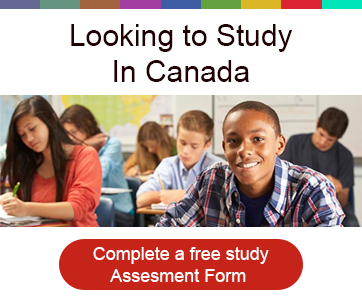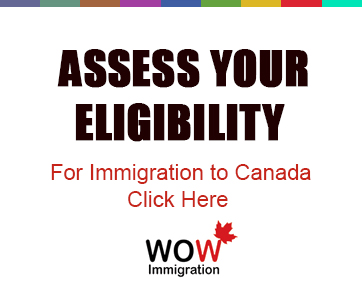In excess of 450,000 global understudies, learn and study in Canada !
A Study Permit is an authoritative archive given by Immigration, Refugees and Citizenship Canada (IRCC) that enables a remote national to read in Canada for a fixed time.
By and large, worldwide understudies need a Study Permit to consider in Canada.
Qualification criteria
To be qualified to present an application for a Canadian report license, an understudy must:
- Hold a Letter of Acceptance from a Designated Learning Institution or college;
- Have enough monetary help to cover the main year of educational cost, everyday costs and travel costs to their own nation;
- Acquire a Certificat d’acceptation du (Quebec Acceptance Certificate, or CAQ) on the off chance that the individual in question wishes to stay in the Province of Quebec;
- Have clean record. Candidates with a criminal past, or who represent a hazard to Canadian security, can’t immigrate to Canada. IRCC may demand a candidate to supply a Police Clearance Certificate;
- IRCC may demand a candidate to finish a medical assessment; and,
- Fulfill the movement documents, that the person in question will leave Canada once the course is completed.
The candidate may likewise be required to present the accompanying records:
- International ID for the candidate and each relative included on the application;
- Two international ID photographs for the candidate and every relative included on the application, with the complete name and date of birth;
- Photocopy of marriage authentication,
Going with relatives
A candidate for a Canadian report license may incorporate their relatives on the application, with the goal that they may go with the candidate to Canada. A going with life partner might almost certainly get an open work grant, and minor kids might probably learn at Canadian rudimentary and secondary schools.
When an understudy meets the qualification criteria and has the right reports, the person in question may apply for an investigation license. This should be possible on the web or by paper. A paper application must be submitted to a visa preparing office outside of Canada.
Monetary fund
Candidates for a Canadian report grant are required to demonstrate they have enough cash to cover the main year of education costs. They likewise need the money related assets to help themselves, and any going with relatives, every year. The accompanying table demonstrate the sums that an understudy is required to have (all sums in Canadian dollars):
Budgetary assets might be demonstrated with:
- Canadian ledger proclamations in the candidate’s name, if cash has been moved to Canada;
- Confirmation of an understudy or instructive advance from a money related establishment;
- The candidate’s bank details from the previous four months;
- A bank draft in convertible cash;
- Verification of installment of educational cost and convenience charges;
- A letter from the individual or foundation furnishing you with cash; and additionally,
- Verification of a grant or financing paid from inside Canada.
On the off chance that an application is affirmed
On the off chance that an application is affirmed, the planned understudy will get:
- A letter of presentation affirming the endorsement. This letter isn’t the examination license.
- Letter of Introduction to the immigration official when touching base in Canada. The Immigration authority may then issue the investigation grant to the understudy.
- An Electronic Travel Authorization (eTA) in the event that the individual in question is from a nation whose residents need an eTA. In such cases, the eTA is shown on the Letter of Introduction.
As the eTA is connected to the candidate’s international ID, the candidate must go with the visa utilized in the examination grant application.
Temporary Resident Visa (TRV)
A Temporary Resident Visa (TRV), in the event that the person in question is from a nation whose natives need a TRV.
The TRV will be in the international ID. The holder must enter Canada before the expiry date on the TRV.
The TRV will likewise demonstrate if the holder can enter Canada just once (a solitary section visa) or on various occasions (a different passage visa). Since 2014, all candidates are consequently considered for various section TRVs.
An individual presenting an application for an examination license does not need to present a different application for a TRV. In the event that the application is affirmed, the TRV will be issued alongside the Letter of Introduction.
Study license
In the wake of getting an examination license, understudies may need to restore or change the investigation grant over the span of their investigations in Canada.
On the off chance that an understudy at a post-optional establishment wishes to change organization, study program, or level of study the person in question does not have to apply for another examination grant. Be that as it may, the individual in question is required to refresh IRCC after evolving establishments. For instance, an understudy may move from Bachelor level to Master’s level, or from Geography to Philosophy, or from a school to a college, without applying for another examination license. The individual in question does not have to apply for a change to the state of the examination grant. An understudy may ponder in Canada as long as the examination license is legitimate.
Be that as it may, a worldwide understudy moving from grade school to secondary school, or from secondary school to a post-optional establishment, is required to apply for an adjustment in the states of the investigation grant. The application must be submitted to the IRCC Case Processing Center in Vegreville, Alberta.
After graduation, numerous understudies remain in Canada to live and work
Study grants terminate 90 days after graduation, paying little respect to the date imprinted on the investigation grant itself. It is critical that global alumni update their status with IRCC inside 90 days of graduation, or they hazard losing status in Canada.
Numerous alumni are qualified to apply for a post-graduation work license (PGWP). This allows the holder to work for any business anyplace in Canada for as long as three years after graduation. Work experience picked up on a PGWP may help encourage an application for Canadian Permanent Residency, particularly through projects, for example, the Canadian Experience Class and certain Provincial Nominee Programs (PNPs).
In the event that a worldwide alumni does not have any significant bearing for a PGWP, the individual may do the accompanying to keep up legitimate status in Canada:
| Number of people | All provinces except Quebec |
|---|---|
| Single student | Tuition plus $10,000 for a 12-month period (or $833 per month) |
| For one accompanying family member add: | $4,000 for a 12-month period (or $333 per month) |
| For each additional family member, add: | $3,000 for a 12-month period per dependent child of any age (or $255 per month) |
In Quebec, the financial requirements for prospective students are different.
| Number of people | Total amount required |
|---|---|
| One person under age 18 | $6,377 |
| One person age 18 or older | $12,750 |
| Two persons age 18 or older | $18,702 |
| One person over age 18 and one under age 18 | $17,137 |
| Two persons over age 18 and one under age 18 | $20,950 |
| Two persons over age 18 and two under age 18 | $22,611 |






